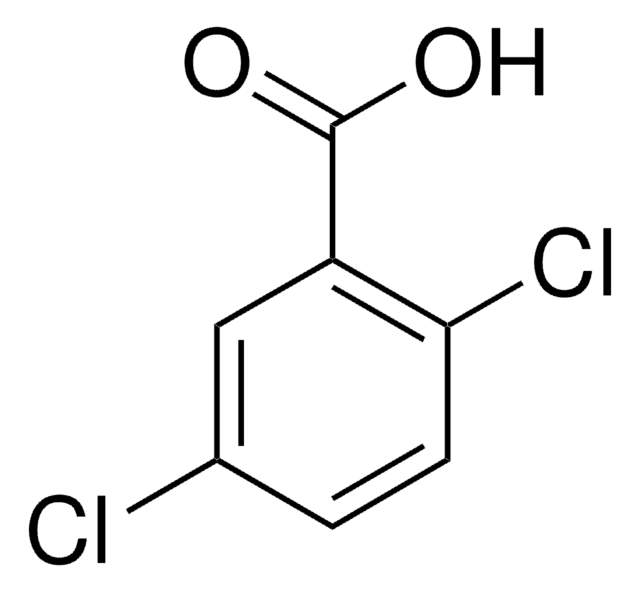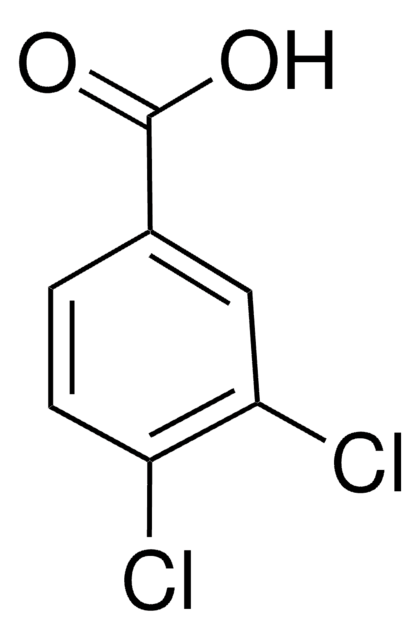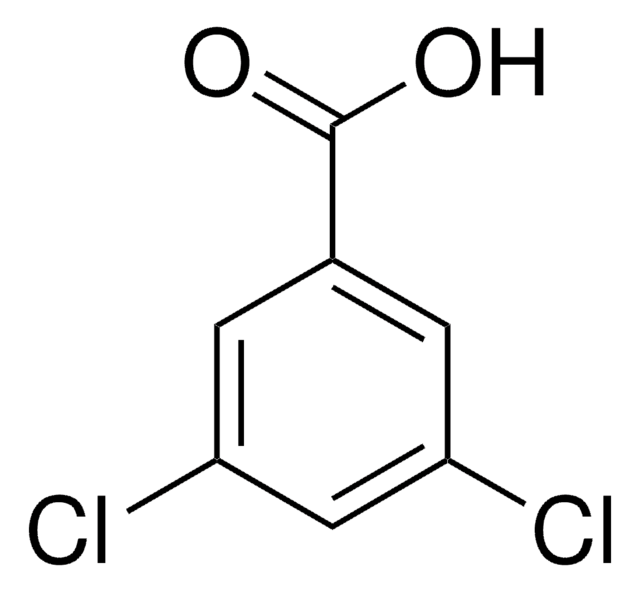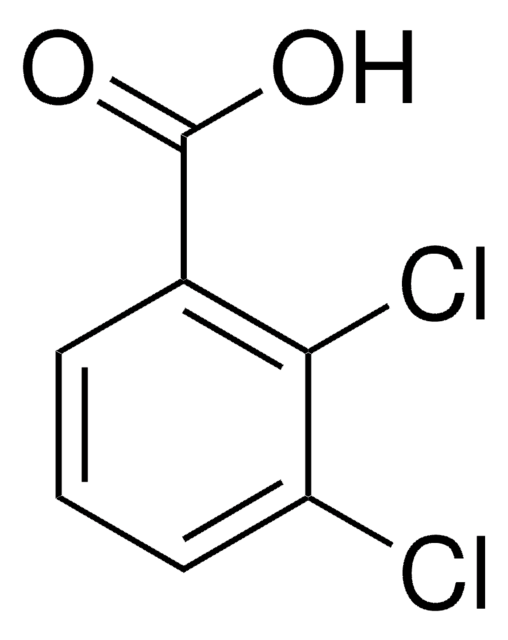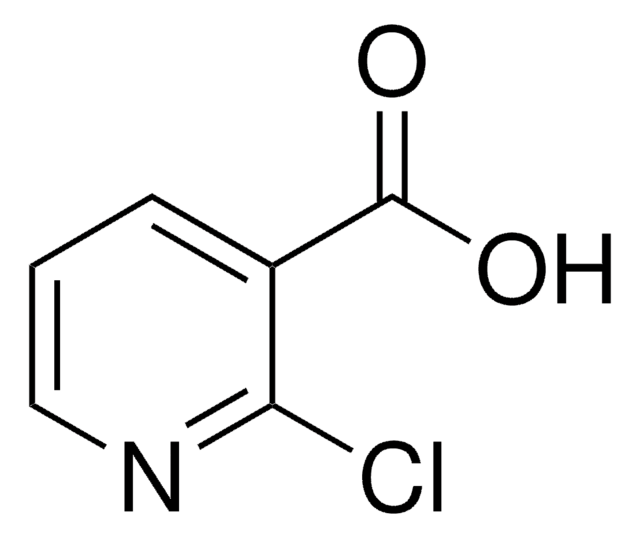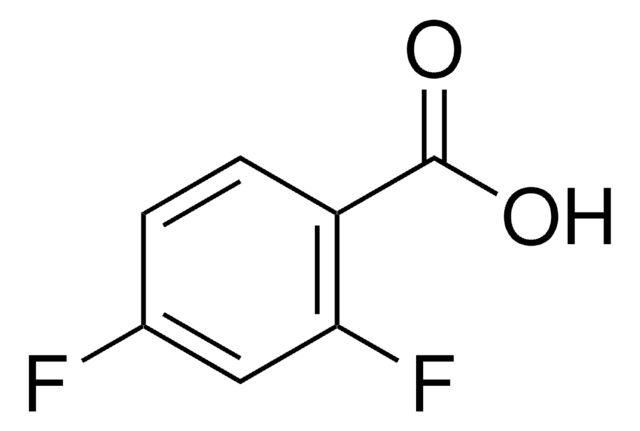All Photos(1)
About This Item
Linear Formula:
Cl2C6H3CO2H
CAS Number:
Molecular Weight:
191.01
Beilstein:
1868192
EC Number:
MDL number:
UNSPSC Code:
12352100
PubChem Substance ID:
NACRES:
NA.22
Recommended Products
Quality Level
Assay
98%
mp
157-160 °C (lit.)
solubility
ethanol: soluble 1 g/10 mL, clear, colorless
functional group
carboxylic acid
chloro
SMILES string
OC(=O)c1ccc(Cl)cc1Cl
InChI
1S/C7H4Cl2O2/c8-4-1-2-5(7(10)11)6(9)3-4/h1-3H,(H,10,11)
InChI key
ATCRIUVQKHMXSH-UHFFFAOYSA-N
Looking for similar products? Visit Product Comparison Guide
General description
2,4-Dichlorobenzoic acid is the degradation product of chlorfenvinphos in water treated by photo-fenton driven by solar irradiation.
Application
2,4-Dichlorobenzoic acid was used in solid-phase extraction and gas chromatographic determination of polar acidic herbicides in surface water. It was used as reagent during the synthesis of pyrimido[2′,1′:2,3]thiazolo[4,5-b]quinoxaline derivatives. It was used as starting reagent during the synthesis of 1-(substituted)-1,4-dihydro-6-nitro-4-oxo-7-(sub-secondary amino)-quinoline-3-carboxylic acids.
Signal Word
Warning
Hazard Statements
Precautionary Statements
Hazard Classifications
Acute Tox. 4 Oral - Eye Irrit. 2 - Skin Irrit. 2 - STOT SE 3
Target Organs
Respiratory system
Storage Class Code
11 - Combustible Solids
WGK
WGK 3
Flash Point(F)
Not applicable
Flash Point(C)
Not applicable
Personal Protective Equipment
dust mask type N95 (US), Eyeshields, Gloves
Choose from one of the most recent versions:
Already Own This Product?
Find documentation for the products that you have recently purchased in the Document Library.
Customers Also Viewed
Gas chromatographic determination of acid herbicides in surface water samples with electron-capture detection and mass spectrometric confirmation.
Vink M and Van der Poll JM.
Journal of Chromatography A, 733(1), 361-366 (1996)
Anthony D Wright et al.
Chemosphere, 65(4), 604-608 (2006-03-24)
The toxic effects of several species of fresh water cyanobacteria, notably Microcystis species and associated toxins, the microcystins, Anabaena species (anatoxin), Nodularia sp. (nodularin), and Cylindrospermopsis raciborskii (cylindrospermopsin), are well known. Little, however, is known about the effects of secondary
Daniel J Repeta et al.
Environmental science & technology, 38(20), 5373-5378 (2004-11-17)
Chromophoric or colored dissolved organic matter (CDOM) is one of the principal light adsorbing components of seawater, particularly in the ultraviolet, where it attenuates over 90% of downwelling ultraviolet radiation. In highly productive coastal regions and throughout most of the
Palaniappan Senthilkumar et al.
European journal of medicinal chemistry, 44(1), 345-358 (2008-05-27)
Various 1-(substituted)-1,4-dihydro-6-nitro-4-oxo-7-(sub-secondary amino)-quinoline-3-carboxylic acids were synthesized from 2,4-dichlorobenzoic acid by six step synthesis. The compounds were evaluated for antimycobacterial in vitro and in vivo against Mycobacterium tuberculosis H37Rv (MTB), multi-drug resistant Mycobacterium tuberculosis (MDR-TB) and Mycobacterium smegmatis (MC(2)) and also
A Iu Sokolov et al.
Eksperimental'naia i klinicheskaia farmakologiia, 74(5), 13-16 (2011-08-04)
Neurophysiological experiments on anesthetized rats were used to study the effects of various doses (12.5, 25, 37.5 mg/kg, i.v.) of drug composition migrepin (representing a combination of potassium-2,4-dichlorobenzoate, carbamazepine, and caffeine) on background firing of the trigeminal nucleus caudalis neurons
Our team of scientists has experience in all areas of research including Life Science, Material Science, Chemical Synthesis, Chromatography, Analytical and many others.
Contact Technical Service